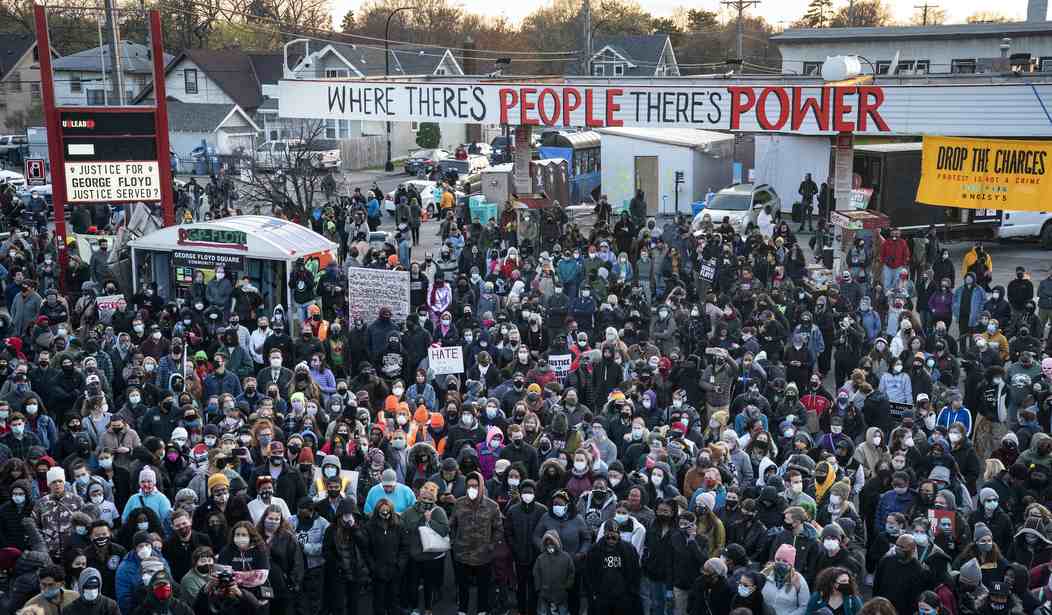On Saturday there was another mass shooting in St. Paul and it was a bad one. One woman was killed and another 13 people were injured at a popular nightspot after three men arrived and began shooting. Three unnamed suspects are in custody, and at least two of the three are described as convicted felons with extensive criminal records. St. Paul is the other half of the Twin Cities, along with Minneapolis, and while things haven’t been quite as bad in terms of crime, they’re bad enough.
This latest attack has led some local members of the clergy to ask where the outrage is over this wanton bloodshed. Faith leaders in the area have been engaged in active programs of community outreach, bringing people out into the streets to get to know each other and to discourage violence by the criminal element. But for some, it seems like a losing battle. (CBS Minnesota)
Following the deadly mass shooting in St. Paul over the weekend, some are wondering why there isn’t more outrage.
St. Paul’s faith leaders have been focused on ’21 Days of Peace, an initiative that unites church and community members to help curb violence in the city. For the past 100 days, volunteers have flooded high-crime areas, working to create change. They had no idea, however, that the West 7th Street business corridor would become a hot spot on Saturday night.
“It’s just disheartening,” The Rev. Runney Patterson said of the shooting that left one woman dead and 14 others injured. “It seems like the value of life…seems like it really just doesn’t matter anymore.”
Reverend Patterson is saying all the right words and doing the best he can. He says that the cycle of violence, criminal activity and death won’t end unless the church and people of faith get back to connecting with people in their homes. And he’s encouraging everyone to reach out to his group, even if the problem you see is in your own home. He’s trying to steer young people away from a life of gang violence. But he’s also grown despondent, saying that it seems as if people have become immune to being shocked by seeing such horrors.
The Reverend isn’t the only one feeling that way. CBS also spoke to Kentral Galloway, the program manager of Next Step, a violence intervention program in St. Paul. He’s been working with both the victims and family members of these many shootings and some of the people on the other end of the guns. He worries that fewer people are coming forward to try to help the community because the shootings have just become “normalized” now.
A few years ago, the group helped a few victims a week. His team is now connecting with two a day.
“That’s the other sad part, we’ve normalized this now,” he added.
Eighty-nine people have sought outreach from Next Step just this year.
“The job of my people is to help people socially, emotionally and mentally,” Galloway said. “The medical team does the rest of the work.”
The violence has been “normalized” to the point where people seem to just go about their business while the victims of these incidents carry the scars, both internal and external, for the rest of their lives. Everyone knows where the trouble is coming from, but nobody wants to say it most of the time. This is gang violence and it’s completely out of control. But much like in Minneapolis, the police officers that St. Paul still has left can’t keep up and are frequently under attack from the same people complaining about all of the bloodshed.
The anti-gun group Minnesota Moms Demand Action tried to get in on the action this week, telling any reporter that would listen that most of these attacks were carried out “with guns.” That is indeed true, but I would point out one inconvenient fact for the group. As with the Sunday night shooting, the people who manage to get caught are largely convicted felons with criminal records. They did not pass a background check to get the weapons they used. They didn’t shop for them at a sporting goods store. They are already barred from owning or purchasing firearms. Another layer of gun control laws isn’t going to stop them because they shop on the black or gray markets.
What both Minneapolis and St. Paul need are more police and more support for the police they have managed to retain. They bring to the party the only thing the gangs actually fear or respect. Firepower and the threat of either death or lengthy incarceration. Not every problem is a nail, but in some cases, you have to bring a hammer. And this is one of those cases.









Join the conversation as a VIP Member